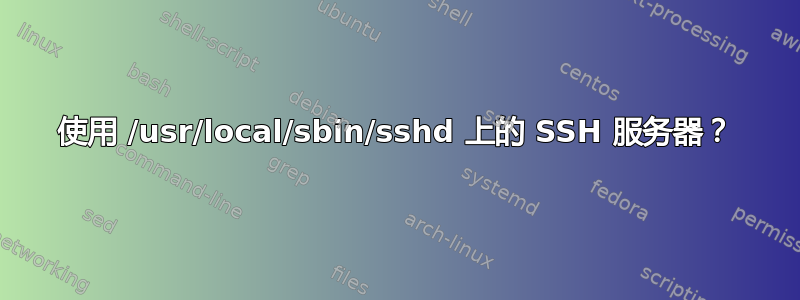
我正在研究MIPSEL ci20 开发板。它运行 Debian 7,因此不再接收安全更新。Debian 8 处于测试阶段,似乎存在一些内存问题,所以目前我不想冒险升级。
我已将 OpenSSL 更新至 1.0.2h(从 1.0.1e 开始),并将 OpenSSH 更新至 7.3(从 6.0 开始)。我还对 OpenSSH 和 OpenSSL 使用了静态链接,以避免在配置期间出现库版本检查问题。
我找不到有关指示 Debian 使用本地 OpenSSH 的信息。我找到的信息以 开头apt-get install openssh-server。例如,Debian wiki 和服务器安装假设 Debian 提供了 OpenSSH。
使用 Grepping 搜索/etc会sshd显示很多硬编码路径,例如:
$ sudo grep -R 'sshd' /etc 2>/dev/null
...
/etc/network/if-up.d/openssh-server:if [ ! -e /usr/sbin/sshd ]; then
/etc/init.d/ssh:test -x /usr/sbin/sshd || exit 0
/etc/init.d/ssh: if start-stop-daemon ... --exec /usr/sbin/sshd -- $SSHD_OPTS; then
...
我如何告诉 Debian 使用 OpenSSH 服务器/usr/local/sbin/sshd?
答案1
可以使用本地 OpenSSH 服务器,包括完全删除发行版 OpenSSH 服务器。共有四个步骤。
构建并安装 OpenSSH 服务器
第一步是构建一个适合你口味的 OpenSSH 版本。OS X 的示例位于为 OS X 构建 OpenSSH?。它也主要适用于 Linux,并使用静态链接(参见sed)来避免配置和动态链接问题。
删除发行版 OpenSSH 服务器
第二步是进行apt-get remove --purge openssh-server。--purge试图确保没有异花授粉。
如果需要,请备份当前版本sshd_config以供将来参考。请注意,OpenSSL 1.0.2 和 OpenSSH 7.3 提供了其前代版本所没有的功能,例如 curve25519。
创建非特权用户
第三步是创建一个非特权用户以进行权限分离。这是必需的,因为之前的非特权用户帐户已被清除。有关此步骤,请参阅README.privsep:
# mkdir /var/empty
# chown root:sys /var/empty
# chmod 755 /var/empty
# groupadd sshd
# useradd -g sshd -c 'sshd privsep' -d /var/empty -s /bin/false sshd
为 sshd-local 添加启动脚本
对于此步骤,请参阅在 Debian 启动时运行脚本来自管理手册。下面的脚本基于 Debian 的 SSH 启动脚本。名称已更改为sshd-local以避免冲突。它还添加了-f /usr/local/etc/sshd_config确保使用正确的配置文件。
#! /bin/sh
### BEGIN INIT INFO
# Provides: sshd-local
# Required-Start: $remote_fs $syslog
# Required-Stop: $remote_fs $syslog
# Default-Start: 2 3 4 5
# Default-Stop:
# Short-Description: Local OpenBSD Secure Shell server
### END INIT INFO
set -e
# /etc/init.d/ssh-local: start and stop the local OpenBSD secure shell daemon
test -x /usr/local/sbin/sshd || exit 0
( /usr/local/sbin/sshd -\? 2>&1 | grep -q OpenSSH ) 2>/dev/null || exit 0
umask 022
if test -f /etc/default/ssh; then
. /etc/default/ssh
fi
if test -f /lib/lsb/init-functions; then
. /lib/lsb/init-functions
fi
if [ -n "$2" ]; then
SSHD_OPTS="$SSHD_OPTS -f /usr/local/etc/sshd_config $2"
fi
# Are we running from init?
run_by_init() {
([ "$previous" ] && [ "$runlevel" ]) || [ "$runlevel" = S ]
}
check_for_no_start() {
# forget it if we're trying to start, and /etc/ssh/sshd_not_to_be_run exists
if [ -e /etc/ssh/sshd_not_to_be_run ]; then
if [ "$1" = log_end_msg ]; then
log_end_msg 0 || true
fi
if ! run_by_init; then
log_action_msg "Local OpenBSD Secure Shell server not in use (/etc/ssh/sshd_not_to_be_run)" || true
fi
exit 0
fi
}
check_dev_null() {
if [ ! -c /dev/null ]; then
if [ "$1" = log_end_msg ]; then
log_end_msg 1 || true
fi
if ! run_by_init; then
log_action_msg "/dev/null is not a character device!" || true
fi
exit 1
fi
}
check_privsep_dir() {
# Create the PrivSep empty dir if necessary
if [ ! -d /var/run/sshd-local ]; then
mkdir /var/run/sshd-local
chmod 0755 /var/run/sshd-local
fi
}
check_config() {
if [ ! -e /etc/ssh/sshd_not_to_be_run ]; then
/usr/local/sbin/sshd $SSHD_OPTS -t || exit 1
fi
}
export PATH="${PATH:+$PATH:}/usr/local/sbin:/usr/sbin:/sbin"
case "$1" in
start)
check_privsep_dir
check_for_no_start
check_dev_null
log_daemon_msg "Starting local OpenBSD Secure Shell server" "sshd" || true
if start-stop-daemon --start --quiet --oknodo --pidfile /var/run/sshd-local.pid --exec /usr/local/sbin/sshd -- $SSHD_OPTS; then
log_end_msg 0 || true
else
log_end_msg 1 || true
fi
;;
stop)
log_daemon_msg "Stopping local OpenBSD Secure Shell server" "sshd" || true
if start-stop-daemon --stop --quiet --oknodo --pidfile /var/run/sshd-local.pid; then
log_end_msg 0 || true
else
log_end_msg 1 || true
fi
;;
reload|force-reload)
check_for_no_start
check_config
log_daemon_msg "Reloading local OpenBSD Secure Shell server's configuration" "sshd" || true
if start-stop-daemon --stop --signal 1 --quiet --oknodo --pidfile /var/run/sshd-local.pid --exec /usr/local/sbin/sshd; then
log_end_msg 0 || true
else
log_end_msg 1 || true
fi
;;
restart)
check_privsep_dir
check_config
log_daemon_msg "Restarting local OpenBSD Secure Shell server" "sshd" || true
start-stop-daemon --stop --quiet --oknodo --retry 30 --pidfile /var/run/sshd-local.pid
check_for_no_start log_end_msg
check_dev_null log_end_msg
if start-stop-daemon --start --quiet --oknodo --pidfile /var/run/sshd-local.pid --exec /usr/local/sbin/sshd -- $SSHD_OPTS; then
log_end_msg 0 || true
else
log_end_msg 1 || true
fi
;;
try-restart)
check_privsep_dir
check_config
log_daemon_msg "Restarting local OpenBSD Secure Shell server" "sshd" || true
RET=0
start-stop-daemon --stop --quiet --retry 30 --pidfile /var/run/sshd-local.pid || RET="$?"
case $RET in
0)
# old daemon stopped
check_for_no_start log_end_msg
check_dev_null log_end_msg
if start-stop-daemon --start --quiet --oknodo --pidfile /var/run/sshd-local.pid --exec /usr/local/sbin/sshd -- $SSHD_OPTS; then
log_end_msg 0 || true
else
log_end_msg 1 || true
fi
;;
1)
# daemon not running
log_progress_msg "(not running)" || true
log_end_msg 0 || true
;;
*)
# failed to stop
log_progress_msg "(failed to stop)" || true
log_end_msg 1 || true
;;
esac
;;
status)
status_of_proc -p /var/run/sshd-local.pid /usr/local/sbin/sshd sshd && exit 0 || exit $?
;;
*)
log_action_msg "Usage: /etc/init.d/ssh-local {start|stop|reload|force-reload|restart|try-restart|status}" || true
exit 1
esac
exit 0


